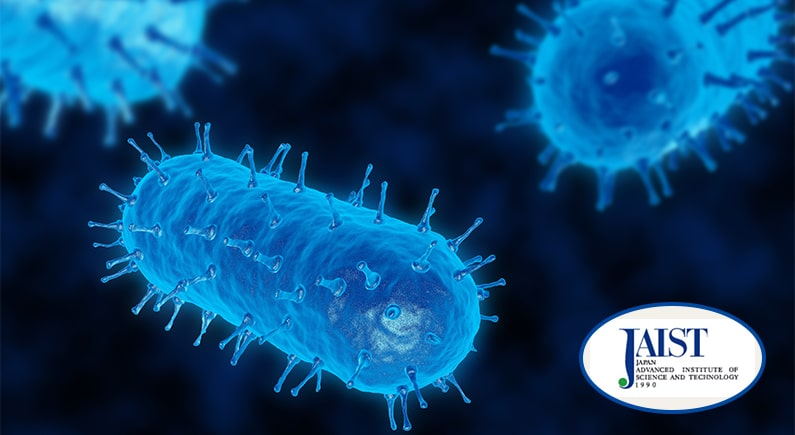
Michael Joe Cini
31st May 2023
Researchers at JAIST Develop Bacterial Anti-Cancer Treatment
Biomedical science has explored the possibility of using bacteria as an anti-cancer treatment against malignant tumours. However, previous efforts have focused on genetic modification or drug delivery to tumours, with bacteria only acting as ferries for drug-based therapy. Scientists at Japan’s Advanced Institute of Science and Technology (JAIST) in Ishikawa have now developed an anti-cancer treatment based on intratumoural bacteria. Preliminary studies have shown powerful anti-tumour effects in cancer models, showing potential as an effective anti-cancer therapy for clinical applications.
Bacteria for anti-cancer treatment
Scientists have known for a while that bacteria in tumours have natural anti-cancer properties, enabling them to live in a naturally hypoxic environment with abnormal cells. As early as 1890, William Coley documented that a neck cancer in one of his patients had begun to recover when the patient had an erysipelas infection. Likewise, bacterially-derived toxins have proved to have anti-cancer activity, currently known as Coley toxins. After Coley’s observations, he later experimented with a vaccine derived from Streptococcus pyrogens and Serrata marcescens, successfully curing sarcomas, lymphomas, carcinomas, and melanomas.
Recognizing these potential advantages, contemporary scientists have undertaken to understand how bacteria can be utilized as anti-tumour therapeutic agents. A recent study, for example, assessed the effects of introducing photosynthetic bacteria into tumours. It showed promising results, with the researchers finding that intramural bacteria, when associated with photosynthetic bacteria, can trigger the immune system to elicit anti-cancer responses, killing the cancer cells. Intratumoural bacteria have been known to have specific characteristics that allow them to grow inside tumours selectively.
Tumour cells aggressively compete for Oxygen and nutrients in their immediate cellular environment, causing a local hypoxic environment. Bacteria that selectively grow inside tumours have properties that help them survive in this environment, which signals their potential to be used for anti-cancer purposes. However, existing bacterial anti-cancer therapies have mainly focused on using bacteria as drug carriers. For example, a 2015 study at Chonnam National University, South Korea, explored the effects of combining a paclitaxel-encapsulated liposome with Salmonella typhimurium. The researchers found that the drug-loaded bacteriobots had a better tumour-killing activity than the drug-containing liposomes, with the bacteria-actuated liposomes showing a much higher average velocity.
While bacteria can potentially deliver drugs to tumours more effectively, researchers have begun recognising their potential to act in anti-cancer therapy using their intrinsic properties. Eijiro Miyako, an associate professor at the Japan Advanced Institute of Science and Technology, has conducted a groundbreaking research project to understand how best to harness the intrinsic capabilities of bacteria to cure cancers. “We succeeded in isolating and identifying three types of bacteria from colon cancer tissues, Proteus mirabilis, which we have termed, A-gyo; photosynthetic Rhodopseudomonas palustris, which we have termed UN-gyo; and a complex bacteria that consists of both A-gyo and UN-gyo, which we call AUN,” he said.
The researchers found that the intratumoural bacteria – A-gyo, UN-gyo, and AUN – can thrive in hypoxic environments and trigger immune responses to kill tumour cells. The association between A-gyo and photosynthetic UN-gyo combined to produce a robust anti-cancer response in mouse models of colorectal cancer, metastatic lung cancer, and extensive drug-resistant breast cancer.
The study also demonstrates the potential for more affordable cancer therapies. Current technologies are relatively expensive, with chemotherapy sessions costing between $1,000 and $12,000 each. Dr Miyako, a lead researcher on the study, notes that “The anti-cancer bacteria assessed in this study can easily be grown in large quantities at low cost in simple, sustainable, low-carbon processes. This would greatly boost the accessibility of anti-cancer treatment worldwide.”
Intratumoural bacterial therapy: A biocompatible mechanism for solving cancer
Aiming to describe their findings on the immunogenic cancer efficacies of isolated intratumoural bacteria and purple photosynthetic bacteria, the researchers published their discoveries in the May 2023 issue of Advanced Science. In the paper titled ‘Discovery of Intratumoural Oncolytic Bacteria Toward Targeted Anti-cancer Theranostics,’ the researchers outlined how they tested the immunogenic properties of bacteria in cancer therapy.
The researchers isolated various bacteria from solid tumours, including Lactococcus species and Enterococcus faecalis. In addition, they grew a culture of Rhodopseudomonas palustris and Proteus mirabilis, which they injected into mice to investigate in-vivo responses. The researchers found that the nonpathogenic photosynthetic bacteria – Rhodopseudomonas palustris and Blastochloris viridis – displayed multifunctionality and biocompatibility, as they did not elicit toxic reactions. In the experiments, PBS injections did not affect tumour growth. However, AUN, A-gyo, and UN-gyo were able to suppress tumour growth after a single administration dramatically. With IV (intravenous) injection of AUN, A-gyo, and UN-gyo, tumours completely disappeared, with no recurrence after anti-cancer treatment.
Mice treated with these bacteria showed significantly increased survival rates, with a 100% survival rate after 120 days. A striking result from the study was the significant near-infrared fluorescence of AUN in tumours, indicating their potential as tumour-specific diagnosis probes. When the researchers tested the effectiveness of the bacteria against various tumour models, there were significant positive results. With an immunogenic murine skin sarcoma, a metastatic lung cancer, and drug-resistant mammary tumours, the AUN injections were effective, with prolonged survival rates even after a single IV administration.
Affordable cancer treatment: a significant challenge
The challenge of solving cancer remediation has been a significant scourge on the population. Annual spending on anti-cancer drugs is over $100 billion. Despite the high demand, prices of advanced anti-cancer medication have skyrocketed. With global economies suffering from unfortunate situations such as poverty and inflation, it has become more difficult for affected groups to afford these medications.
The functional bacteria discovered in this study may be the key to affordable cancer therapy in the coming years. The bacteria identified in this study can be proliferated in inexpensive culture media, which may solve the cost issue, which has traditionally been associated with cancer medicines. These functional bacteria are also useful hardware in which genes can be chemically modified to obtain higher therapeutic performances and functions.
Eijiro Miyako, an associate professor and researcher at the Graduate School of Advanced Science and Technology, Japan Advanced Institute of Science and Technology, was the lead author of this project. Other members of the team are Yamato Goto, Seigo Iwata, and Mikako Miyahara of the Japan Advanced Institute of Science and Technology.
Funding for the project was financially supported by the Japan Society for the Promotion of Science (JSPS) KAKENHI Grant-in-Aid for Scientific Research, JSPS KAKENHI Grant-in-Aid for Challenging Research, and the Japan Science and Technology Agency for Adaptable and Seamless Technology Transfer Program through Target-driven R&D. Additional support came from the Institute for Fermentation, Osaka, and the Uehara Memorial Foundation.
EXPERIENCE THE MED-TECH WAVE IN MALTA!
Mark your calendars for October 19-20 and seize the opportunity to participate in the Med-Tech World Summit in Malta. Engage with the brightest minds in healthcare and technology as they redefine the landscape of medicine. Don’t miss out on this remarkable event!




